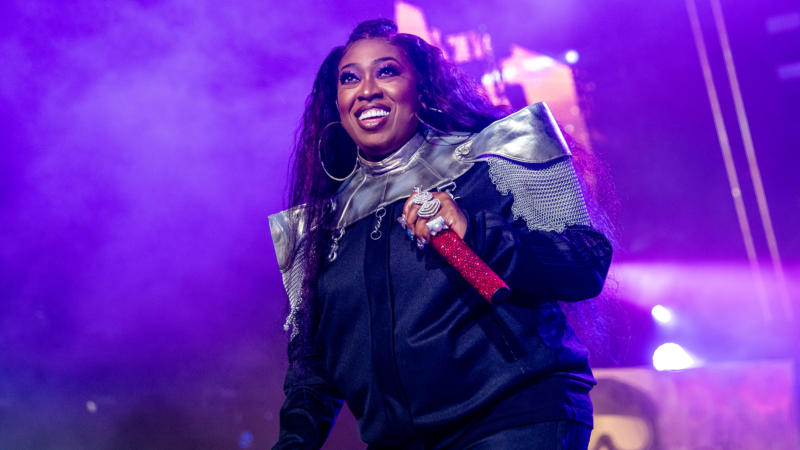Missy Elliott is a legend — who is also all about her coins.
The DMV legend found herself in the headlines when Jowell — of the popular reggaeton group, Jowell Y Randy — brought her name up in an interview. In his interview, he claimed that Elliott threatened to sue and “demanded millions” when it was revealed that the Bad Bunny hit, “Safaera,” sampled more than a little bit from “Get Ur Freak On.”
Naturally, Jowell’s comment unleashed a tirade of online hatred against Missy Elliott. And at one point, things got so bad that an Ariana Grande fan page called out Jowell for his comments in his interview.
Thank you jowel!
Thank you for all the hate your interview is bringing Missy!
Had you explained that there was 6 samples and 15 writers maybe they wouldn't all be attacking Missy for no reason because she took "everything"https://t.co/uNGNZawPqm— Ariana Fanpage (@BigAriGrande) March 16, 2022
Things only got worse when Jowell doubled down on his comments.
Fuck that! Let them enjoy their money. Its not you and me enjoying it right ? Let them be happy and talk about something else . Missy dont even care . Why would you ?
— Jowell (@jowell1) March 17, 2022
But after Missy Elliott pointed out that Jowell was “misleading” people with his claims, he backtracked and wanted people to “chill.”
And by the way I do care.. this is very irresponsible….I hope you clear this..
— Missy Elliott (@MissyElliott) March 17, 2022
Missy, something got lost in translation cuz i never said u take 99% thats imposible there are a whole bunch of other peoples in there. Im cool with my 1% . Excuse me , Nothing but love from Puerto Rico to you. We are both in business. Let’s chill and enjoy what we have. Peace ✌🏻
— Jowell (@jowell1) March 18, 2022
The messiness of all the claims aside, Missy Elliott is well within her rights — legally — to get her royalty percentage from the song sample, as explained by Rolling Stone.
Let’s take a look at the music business when it comes to music royalties and sampling.
What percentage of "Safaera" does Missy Elliott get?
In a statement provided on Twitter, Missy Elliott claims that she only received 25 percent of the royalties from “Safaera.”
@jowell1 sadly you mislead all these people to make them think I have 99%. Now I don’t talk business on line because that’s messy but now we are here I have 25% and there is 6 other samples & 15 other writers on this one song. They got percentage also…
— Missy Elliott (@MissyElliott) March 17, 2022
"Safaera" already had licensing issues
Billboard reports that “Safaera” already had licensing issues in the recent past. In October 2021, Bad Bunny and his collaborators got slapped with a copyright infringement suit for what is being called the “unauthorized incorporation” of various songs from DJ Playero.
Sample Clearance And Music Royalties, Explained
While Missy Elliott isn’t the only artist who has ever faced a copyright issue when it comes to her music, there are a few things to know about legally clearing samples, which Moses Avalon explained in his groundbreaking book, “Confessions of a Record Producer.”
First, you need to obtain permission from both the copyright holder of the recording itself (i.e., the record label) and the song itself (i.e., the original writer of the song). You have to obtain permission from both to use the sample because failure to do so will result in a lawsuit.
And that’s not all.
Many record labels require both a money advance for rights to use the music (which can be hundreds, if not thousands, of dollars — and the longer the sample, the more money you have to pay) plus a rollover fee (which is how much extra you’ll have to pay when song sales/downloads/streams reach a certain threshold) and a percentage of the royalties.
As far as what percentage of the royalties have to be forked over by the sampling artist, the numbers vary. Historically, rock artists have been much less forgiving than Hip-Hop and R&B artists when it comes to sampling — with the best example being The Verve, who (according to Rolling Stone) were denied receiving royalties for their hit song “Bittersweet Symphony” for two decades because they failed to get proper clearance from Mick Jagger and Keith Richards for a tiny sample of a “throwaway” song they once composed.
Then there’s MC Hammer’s “U Can’t Touch This” which sampled Rick James’ “Superfreak.” To avoid dragging out a court case, Hammer ultimately agreed to credit James as a songwriter on the track.
“With little defense, he ended up giving James a co-writing credit and half the royalties from his massive hit,” E! News reports.
So, if Jowell thinks Missy Elliott is bad for taking 25 percent of “Safaera,” he should be grateful that that’s all she asked for.


